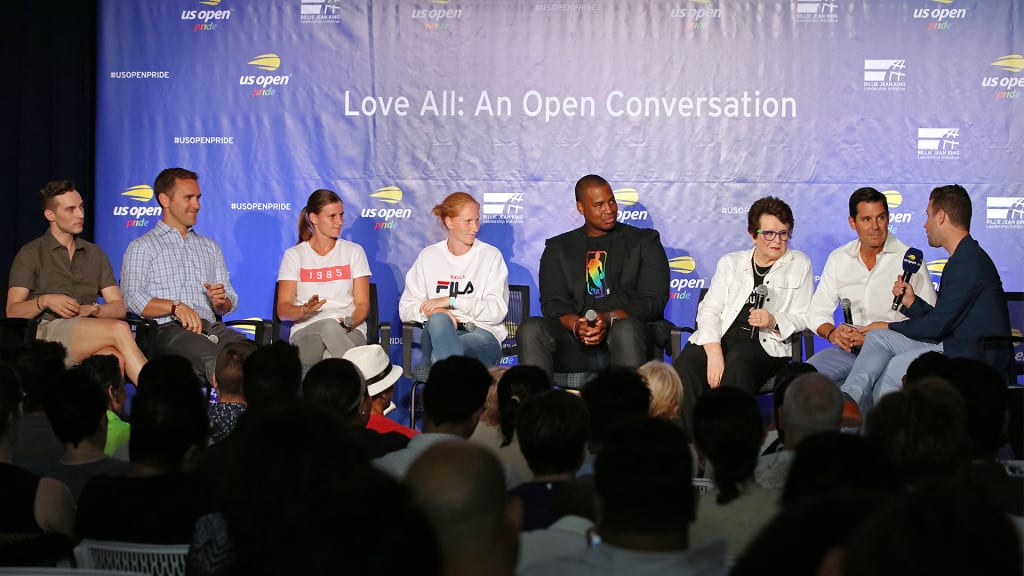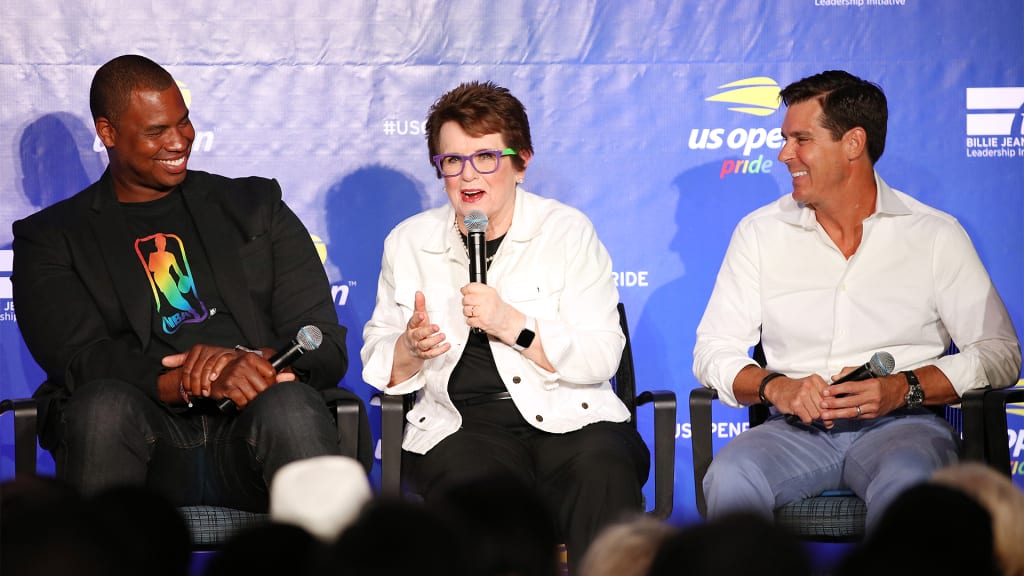
NEW YORK -- On Thursday evening, the U.S. Open played host to a panel discussion entitled “Love All: An Open Conversation,” featuring a set of former and current athletes who identify as part of the LGBTQ+ community. The roster included MLB’s Billy Bean, now vice president and special assistant to the Commissioner; the ATP’s Brian Vahaly, now on the USTA board of directors; the NBA’s Jason Collins, now an ambassador for NBA Cares; U.S. figure skater Adam Rippon, a 2018 Winter Olympics bronze medalist; Belgian tennis players Alison Van Uytvanck and Greet Minnen, doubles partners who are also a couple; as well as a special appearance by Billie Jean King.
Inside the Chase Center on the grounds of Arthur Ashe Stadium, the panel of eight -- including host Nick McCarvel, an out sports journalist -- engaged in a wide-ranging dialogue about their respective journeys toward coming out in the public eye and in their private lives, about the cultural differences between the treatment of male and female athletes by fans and the media and about how sports can be an agent of change on the topic of diversity and inclusion.
As the panelists took the stage, they were treated to a rousing standing ovation from the full house in attendance. King, dressed in a shirt with the message “Come As You Are” in bold lettering, even had a personal cheerleading squad, to which she commented, “I could’ve used you in the '60’s, '70’s, '80’s!” As McCarvel noted, the response was a “far cry” from the previous iteration of their #LGBTennis initiative last year, when they had to settle for a cramped bookstore in Soho.
Given the U.S. Open’s body of work as a trailblazer in the sport -- becoming the first Grand Slam to offer equal prize money to men and women in 1973, naming the largest tennis stadium in the world after legendary African-American tennis player Arthur Ashe in 1997 and rededicating its National Tennis Center stadium complex for King in 2006 -- Vahaly thought it would be the perfect venue for the panel. Within 24 hours, the plan was in motion.
As the panelists shared their stories Thursday, they found solace and solidarity in each other. Shame was a central theme that ran through all their roads to acceptance, as they grappled with their identities and how they would be received.
Bean, who grew up in a conservative military household as the oldest of five boys, said the thought of coming out was never even a possibility. He left baseball because his partner died of HIV before he had introduced him to his family, teammates or anyone else. Isolated, he felt someone like him didn’t belong in the sport.
“If I would have known [Collins] at that time, it would have changed my life. Every single decision I made would have been different,” Bean said. “For someone from my generation, I just stood there with my mouth open [watching Rippon at the Olympics], like, ‘This is amazing’ -- to take your moment, to find the courage and strength to make a message that would last forever and impact lives.
“This is why it’s so important for the visibility. It’s important for us to tell our stories when we are ready.”
King didn’t have that opportunity, as she was infamously outed in a 1981 lawsuit, losing all her endorsements overnight just when she was on the cusp of a breakthrough in the sport. With homophobic parents who “were loving in every other way” and a lawyer and PR team who instructed her “not to tell the truth,” King said it took her a long time to recover.
“I am so happy for each and every one of us up here that we finally got there, in our way, in our journey,” King said. “… I could have been absolutely sobbing up here, if you really want to know the truth.”
The panelists shared that while the initial reactions to their coming out were mostly negative -- which Bean distilled to “progress and change makes people uncomfortable” -- there is an additional challenge within the culture of male team sports. As King pointed out, at press conferences, female athletes are asked incessantly about their sexuality; meanwhile, there is a presumption of straightness for male athletes.
Vahaly said he often dealt with people wanting to set him up with their female friends or relatives. Collins said he heard homophobic language used openly in the locker room, though it wasn’t directed at him because he wasn’t out yet. Still, he made sure there is now a league-mandated $50,000 fine for it.
The larger point Collins makes to players across the NBA and WNBA is the need to be welcoming to people from all walks of life. He frames it by drawing upon the fact that most of them have walked into rooms where they were the only one of something -- whether by race, class, gender or religion -- so they should be able to empathize with and embrace people from all backgrounds.

Bean said that in his job, he is usually the only out gay person in any room, which informs his understanding of the burden of carrying the mantle in male sports culture, in comparison to what King managed to do for women’s sports.
“It’s wanting to be like the guys that came before you and having that acceptance and being respected for your talent,” Bean said. “Every time Jason or myself is mentioned in an article, we are the gay player; we’re not a player who happens to be gay. And so that makes it a huge choice for a male athlete right now to consider. We have to change the culture so those great athletes that happen to be part of the LGBT community will feel comfortable.
“I think that women’s tennis is unique in the fact that two on Mount Rushmore [King and Martina Navratilova] came out before there was even a conversation about it. So people were comfortable, you were household names, they were familiar with you and that changed whatever sexist bias goes into the thought of two women together vs. two men together. … Even when people wanted to dislike you, they still had to say, ‘She’s the most badass tennis player in the world.’”
That’s why, as MLB’s first ambassador for inclusion since 2014, Bean has led the company’s diversity and inclusion efforts, including Pride Nights at the each of the stadiums across the country.
“We prioritize the understanding that we have to try to create well-rounded citizens if you are participating in the sport of baseball,” Bean said. “We are the sport of Jackie Robinson. With just that legacy in and of itself, we owe it the communities that we play in front of to educate our players, because what they say and what they do will grow that message faster than any executive behind the scenes.”
As current and former athletes, these panelists would know that better than anyone.